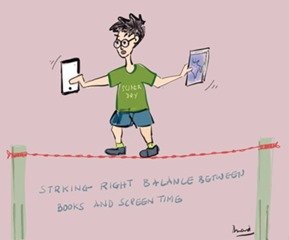Currently Empty: ₹0.00
Parenting
Screen Time Guidelines for Parents

Screen Time Guidelines for Parents
Screen time is the total time spent per day in viewing screens such as mobile phone, TV, computer, tablet, or any hand-held or visual device. Screens have become an essential part of our life. Parents, teachers, and health professionals are concerned about the increase in children’s screen time. Just like the balanced food that we eat, screens need to be properly chosen and to be consumed in the right quantity and at the right time.
The way we use the screens determines whether it is healthy or unhealthy. Screen time spent for educational or prosocial activities such as schoolwork, interacting with friends and relatives, and creating art or music or relaxation is termed positive or healthy, while watching inappropriate TV shows, visiting unsafe websites, or playing violent video games are few examples of negative or unhealthy screen time.
If your child is in an online school, let him/her attend online classes. But after the classes they should do self study on their books. Do exercises in workbooks. We need to balance digital and nondigital mediums. Too much of anything is bad. Both should be used in moderation. If your child is attending online classes for long it’s not good. Online classes cannot be for the whole day. It should be for a limited number of hours. After class they should work on their textbook and workbook.
Screen Time Guidelines for Parents: How long can my child use screens?
Should I limit screen time? What is the effect of using screens for a prolonged time on my child? Children below the age of 2 years should not be exposed to any type of screen with the exception of occasional video call with relatives. Screen time for children between the age of 2 and 5 years should not exceed 1 hour; the lesser, the better. For older children and adolescents, it is important to balance screen time with other activities that are required for overall development. These activities include an hour of physical activity (play time), adequate duration of sleep (recommended sleep time varies with age, for example, adolescents require 8–9 hours of uninterrupted sleep at night), and time for schoolwork, meals, hobbies, and family time. If any of these activities is displaced due to screen use, then it is called excessive screen time and it should be reduced.
The World Health Organization (WHO) recommends the following screen time guidelines by age:
- Infants (less than 1 year of age): No screen time
- 1-2 years of age: No screen time
- 2 to 5 years old: No more than one hour
- 6 to 10 years old: No more than 1 & half hour
- 11 to 16: Not more than 2 hours
- Adults: Not more than 4 hours
Screen Time Guidelines for Parents: Are there any benefits of the digital devices?
When screens are used in moderation in a balanced and healthy way, they have many benefits. Indian Academy of Pediatrics (IAP) has prepared a list of benefits which include the following: –
- Encourage learning and knowledge
- Act as a tool for communicating with friends and family and promote social interaction
- Healthy co-viewing and co-playing using digital platforms improve child and parent bonding, recreation, and relaxation.
- Smartphone Apps such as Saathiya, Calm, and digital platforms such as NIMHANS online yoga class encourage kids to adopt healthy behaviors and kindle device promotes reading
- Channels like YouTube and blogging platforms give opportunities to children to display their talents
- Customized computer programs can improve social behavior in children with autism and study skills in children with learning problems.
Screen time is the total time spent per day in viewing screens such as mobile phone, TV, computer, tablet, or any hand-held or visual device. If any of the essential activities such as sleep, physical activity, study, family, meal, and hobby times is displaced due to screen time, then it is called excessive screen time and it should be reduced.
Screen Time Guidelines for Parents: Key Point to Remember
- Screen time is the total time spent per day in viewing screens such as mobile phone, TV, computer, tablet, or any hand-held or visual device.
- If any of the essential activities such as sleep, physical activity, study, family, meal, and hobby times are displaced due to screen time, then it is called excessive screen time and it should be reduced.
- Avoid the use of digital devices in children <2 years.
- Balance the usage of screen and books
- Healthy media usage promotes learning, creativity, social interaction, and holistic wellness.
- Unhealthy media usage affects physical, psychological, social, and academic wellbeing of a child.
- Implement digital rules, digital hygiene, and nurture responsible digital citizenship.
- Consult a mental health professional at the earliest on detecting flag signs of media addiction.
- Act as a role model for healthy media use.
